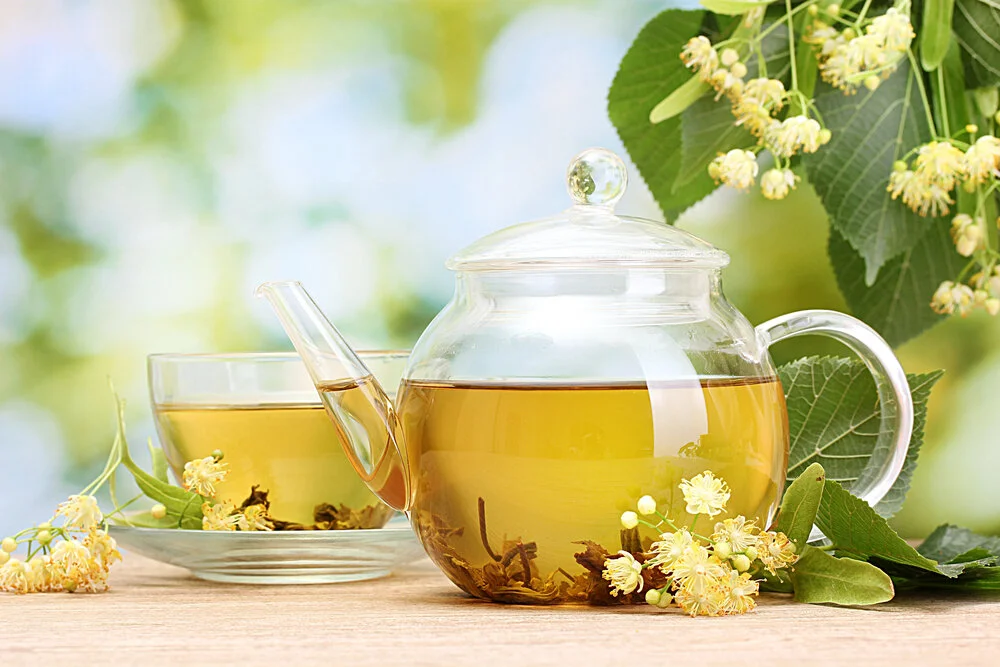A Soothing Herbal Remedy With Centuries of Tradition
Linden tea, made from the flowers of the linden tree (Tilia cordata, Tilia platyphyllos, or Tilia americana), has been used in traditional medicine for generations. Known for its mild sedative effects, pleasant floral aroma, and soothing properties, linden tea is a go-to natural remedy for stress relief, cold symptoms, and more.
But while this gentle tea is generally safe for most people, it’s not entirely without risks. Let’s take a closer look at its key benefits, medicinal properties, and contraindications you should be aware of.
🌿 What Is Linden Tea?
Linden tea is made from the dried flowers, and sometimes leaves and bark, of the linden tree. These trees are commonly found throughout Europe and North America and are easily recognized by their fragrant yellow blossoms.
The tea has a light, sweet taste with floral notes and is most often consumed for its calming, antispasmodic, and anti-inflammatory effects.
Benefits of Linden Tea
1. Promotes Relaxation and Sleep
- Acts as a mild sedative, helping to calm the nervous system
- May ease anxiety, nervous tension, and insomnia
- Often used before bedtime for better sleep
2. Relieves Stress and Nervous Tension
- Natural calming effect without strong sedation
- Can help reduce mild palpitations or tension headaches caused by anxiety
3. Soothes Cold and Flu Symptoms
- Diaphoretic effect (promotes sweating), which can reduce fevers
- Eases sore throats, coughs, and nasal congestion
- Anti-inflammatory and mild expectorant effects support respiratory relief
4. Supports Digestion
- Helps relieve stomach discomfort, cramping, and indigestion
- May reduce gas and bloating thanks to its antispasmodic action
5. Mild Cardiovascular Support
- Traditionally used to support heart health and lower mild high blood pressure (when stress-related)
- May gently dilate blood vessels and improve circulation
Key Properties of Linden Tea
Linden flowers contain several beneficial compounds, including:
- Flavonoids (antioxidants) – like quercetin and kaempferol
- Tannins – which have astringent and anti-inflammatory properties
- Mucilage – a slippery substance that soothes irritated tissues
- Volatile oils – such as farnesol, which has calming effects
These compounds give linden tea its calming, anti-inflammatory, antispasmodic, and expectorant properties.
How to Prepare Linden Tea
Simple Linden Tea Recipe:
- 1–2 teaspoons of dried linden flowers (or 1 tea bag)
- 1 cup (250 ml) of hot water
- Steep for 5–10 minutes, covered
- Strain and enjoy, up to 2–3 cups daily
💡 Optional: Add honey and lemon for added flavor and soothing benefits.
⚠️ Contraindications and Side Effects
Linden tea is generally safe in moderate amounts, but some people should use it with caution.
❌ Avoid or Consult a Doctor If You:
- Have heart disease: There have been rare reports of heart damage with excessive use; those with heart conditions should consult a doctor first
- Are pregnant or breastfeeding: There isn’t enough safety data, so avoid unless advised by a healthcare professional
- Have low blood pressure: Linden’s mild vasodilating effects may enhance hypotension
- Have allergies to linden or related plants: Rare, but possible
- Take diuretics or sedatives: Linden may enhance the effects of these medications
🧠 Drug Interactions:
- May enhance the sedative effects of medications like benzodiazepines or sleep aids
- May interact with blood pressure or heart medications
🔔 Note: Always speak to a healthcare provider if you’re on medication or managing chronic health conditions.

Linden tea is a time-tested herbal remedy known for its ability to soothe nerves, aid sleep, relieve cold symptoms, and ease digestive discomfort. It’s gentle, aromatic, and effective for promoting a sense of calm — especially during times of stress or illness.
✅ Quick Recap:
| Benefit | Effect |
|---|---|
| Relaxation & better sleep | Natural sedative, relieves anxiety |
| Cold & flu relief | Promotes sweating, eases sore throat/cough |
| Digestive support | Relieves cramps, indigestion |
| Mild cardiovascular support | May reduce tension-related high blood pressure |
| Avoid If | Reason |
|---|---|
| You have heart conditions | Possible cardiac effects (rare but reported) |
| You’re pregnant or breastfeeding | Insufficient safety data |
| You take sedatives or diuretics | May enhance drug effects |
| You have low blood pressure | Could cause mild drop in BP |

